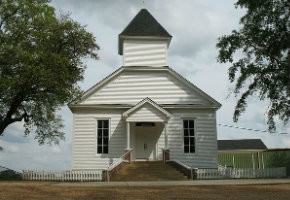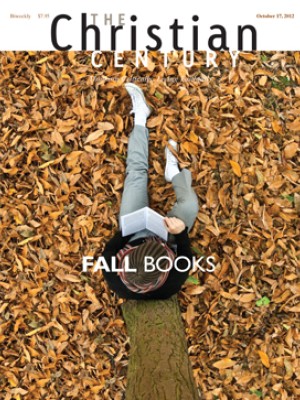Baptist again: Going back to church
In a Baptist church at age seven I “accepted Jesus Christ as my personal savior”—an emotional and powerful experience that I have tried to respectfully write about in fiction. Sixty years later, I sometimes think about what drove me toward that decision. My mother influenced me, that’s for sure. So did the total experience of the church and its embrace of me.
Back then I believed that something substantial existed up beyond the blue sky—a place as solid and touchable as the nearest Dairy Queen. That was heaven, and I was headed there.
Heaven was no less certain than ice cream, but if I was bad I could never go there. This part got complicated: I would go there only if I were forgiven for my sins—which happened when Jesus died on the cross. In spite of that death on the cross, I had to confess my sins or I wouldn’t make it to heaven. Finally, with an acceptance of Jesus Christ as my personal savior the question was settled.
Read our latest issue or browse back issues.
At 18 I left home for the University of North Carolina in Chapel Hill, about a 30-minute drive from where I lived. When I came home on weekends I’d attend church. One Sunday the preacher talked about what an evil place Chapel Hill was. I was coming to love Chapel Hill. I thought the preacher was wrong to assign evil to a place, but I was not brave enough to tell him so.
And at about this time, in the early 1960s, the civil rights movement was beginning to shake the earth around me. One Sunday in a church business meeting a member of our church asked what the church should do if a black person (other than the janitor) came to the church door and asked to enter. After some discussion an answer was reached: “Inform him that he has his own church.” I remember sensing that the person who asked the question was in trouble. I’ve always wondered if he agreed with the answer he was given.
I can’t help noting that at a time when many people are examining their church’s attitude to outsiders, the Southern Baptist Convention’s website lets us know that the Bible condemns homosexuality and tells us that women shouldn’t be preachers. If it had had a website during the Civil War, it would have told us that the Bible condoned slavery.
At 22 I left North Carolina and my church. I wasn’t particularly bitter, but I never planned to be back in a Baptist church. The strings holding me had become too frayed.
Some years ago my wife Kristina and I started having little services in the backyard with our three children (all under seven). I’d read a short scripture (often from a New Testament as recorded by Thomas Jefferson or Tolstoy), usually about doing unto others as you would yourself or about serving the least of these. I’d follow with a one-minute sermon, then we’d look for a bird and try to name it, and finally each of us would name something we were thankful for (in addition to the bird). We’d finish by singing a song.
Soon we decided we needed a regular church so that we could offer the kids—and perhaps ourselves—something a little more structured. We started attending different Protestant churches in our hometown, and for one reason or another didn’t feel comfortable with any.
In the meantime our children were attending a fine preschool at a Baptist church affiliated with the Cooperative Baptist Fellowship. I accidentally ran into the preacher one day, and we had a good conversation about fiction writing. Kristina and I decided to attend a service at his church. In that service the preacher pushed love of neighbor and racial reconciliation.
We’ve been attending fairly regularly for a couple of years now, and I think the fact that my old church and my new one are both Baptist has helped me find connections between the two. Sitting in my new pew, I’ve realized that the strings were frayed less than I thought. In spite of threats, angry shouts and dogmatic scripture interpretations I’d heard in the Baptist church of my childhood, I always felt safe there. I think that was in large part because of the kindness shown to me by the elderly people in the congregation. Their attitude toward me may have been partly a consequence of my mother’s going out of her way to be kind to them; I can imagine them taking an interest in me (her only child) because of that. They helped shape me. Partly because of them I’m sometimes conscious of stooping to look into the eyes of a youngster and ask questions and talk.
I’ve also realized that though my belief in heaven as a physical place has disappeared over the years, a related notion remains: a notion (not quite as strong as a belief) that something more important than what goes on around me everyday exists in an almost touchable way. It’s almost as if through churchgoing as a child I came to believe that there is a kind of final answer about things that one can reach for in times of decision making or trouble. If I’d not been shaped in my childhood Baptist church to believe in a physical heaven, I’m not sure I would have ended up with my present notion of “something bigger.”
One Sunday my preacher said something from the pulpit about “the character of God.” I wondered about his basis for his insight. I invited him to breakfast and asked him to explain his view of the character of God and the source of that view. He responded that he thought that was a good question. We had what was for me a stimulating conversation. Two years of occasional breakfasts together have followed, and they’ve included all sorts of theological exchanges.
I’ve decided that for me God is the mysterious source of life. This means I’m obliged to respect all kinds of things I might not respect if I didn’t hold on to that particular something bigger. It means I can define my worship as service to stuff that’s alive—to plants, people, animals. So the kindness of old folks at church stayed with me, and this notion of something bigger didn’t leave.
Here’s a third thing I’ve realized: the old hymns warm me like nothing else. If while growing up you heard “What a Friend We Have in Jesus,” “Just As I Am,” “Softly and Tenderly,” “The Old Rugged Cross” and “Blessed Assurance” several hundred times each, in an environment where you felt safe, you understand. If you didn’t grow up with that experience, then there’s surely an analogy available—such as how the smell of smoke from burning leaves reminds you of time with a beloved grandparent or parent and the lessons that were learned then.
So I go to a Baptist church these days (usually to the traditional service) in part because I love to hear the old hymns, and I feel a kind of safety left over from half a century ago. I like the sermons because they often connect scripture with love for neighbor—the biggest “something bigger” I can imagine these days.







